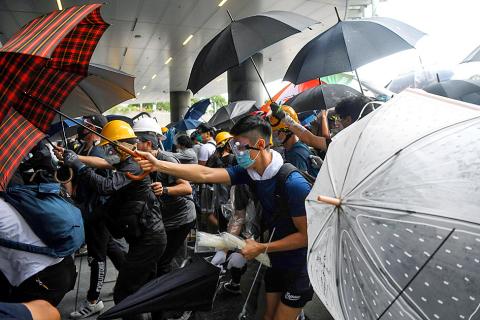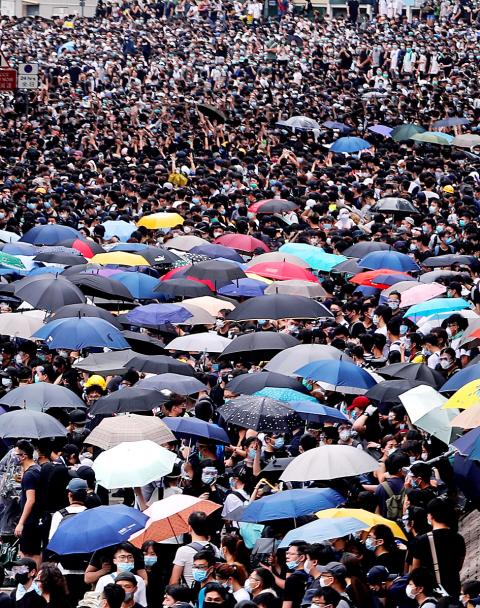Hong Kong police yesterday fired tear gas and rubber bullets at protesters who had massed outside government headquarters in opposition to a proposed extradition bill that has become a lightning rod for concerns over greater Chinese control in the territory.
The violence came after protesters earlier in the day forced the delay of a legislative debate over the bill, which would allow criminal suspects in Hong Kong to be sent for trial in China.
The mainly young crowd had overflowed onto a major road as they overturned barriers and tussled with police outside the government building, but when some appeared to have breached a police cordon around the building, the police launched their response, which also included firing pepper spray and water hoses.

Photo: AFP
Earlier, a curt government statement said that the legislative session scheduled to begin at 11am would be “changed to a later time.”
Officials gave no indication of when that would be and Hong Kong Chief Executive Carrie Lam (林鄭月娥) canceled a scheduled news briefing.
Some businesses closed for the day, and labor strikes and class boycotts were called.

Photo: Reuters
At a brief news conference, Hong Kong Police Commissioner Stephen Lo (盧偉聰) called the demonstration a riot, potentially meaning long jail terms for anyone arrested.
“We condemn such irresponsible behavior,” Lo said. “There’s no need to hurt innocent people to express your opinions.”
Protesters were seen throwing rocks, bottles, metal barricades and other projectiles at police.
Police spokesman Kong Wing-cheung (江永祥) defended the decision to use non-lethal weapons, saying that officers would not have had to do so if they were not facing a serious threat.
The state of the legislative process remained unclear following the violence, which had largely ended by about 5pm after police herded demonstrators across a pedestrian bridge.
However, traffic in one of the busiest parts of the territory remained blocked and several hundred protesters seemed in no hurry to leave.
Earlier in the day, protesters said that they hoped the blockade would persuade Lam’s administration to shelve the amendments.
Dressed in black T-shirts and jeans, many protesters appeared undaunted by demands to disperse from police.
They also seemed mindful of Beijing’s growing use of electronic surveillance such as facial recognition technology to build dossiers on those it considers politically unreliable, with many donning surgical masks to hide their features, as well as to safeguard against tear gas.
Hong Kong residents can face travel bans and other repercussions if they cross the border into mainland China.
“Most of these protesters don’t expect the government to compromise. They just want to express their own opinions,” said Joseph Cheng (鄭宇碩), an observer of Chinese and Hong Kong politics now retired from the City University of Hong Kong. “The anger is still there and the anger will burst again at the next opportunity.”
The government pushed ahead with plans to present the amendments to the legislature yesterday, despite a weekend protest by hundreds of thousands of people.
Lam has defended the legislation as necessary to close legal loopholes with other countries and territories. A vote is scheduled on Thursday next week.
At a regular briefing, the Chinese Ministry of Foreign Affairs repeated its support for the bill.
Spokesman Geng Shuang (耿爽) also denied that Beijing has been interfering in the territory’s affairs in a way that contravenes agreements made when Hong Kong was handed back to China.

CHAOS: Iranians took to the streets playing celebratory music after reports of Khamenei’s death on Saturday, while mourners also gathered in Tehran yesterday Iranian Supreme Leader Ayatollah Ali Khamenei was killed in a major attack on Iran launched by Israel and the US, throwing the future of the Islamic republic into doubt and raising the risk of regional instability. Iranian state television and the state-run IRNA news agency announced the 86-year-old’s death early yesterday. US President Donald Trump said it gave Iranians their “greatest chance” to “take back” their country. The announcements came after a joint US and Israeli aerial bombardment that targeted Iranian military and governmental sites. Trump said the “heavy and pinpoint bombing” would continue through the week or as long

TRUST: The KMT said it respected the US’ timing and considerations, and hoped it would continue to honor its commitments to helping Taiwan bolster its defenses and deterrence US President Donald Trump is delaying a multibillion-dollar arms sale to Taiwan to ensure his visit to Beijing is successful, a New York Times report said. The weapons sales package has stalled in the US Department of State, the report said, citing US officials it did not identify. The White House has told agencies not to push forward ahead of Trump’s meeting with Chinese President Xi Jinping (習近平), it said. The two last month held a phone call to discuss trade and geopolitical flashpoints ahead of the summit. Xi raised the Taiwan issue and urged the US to handle arms sales to

State-run CPC Corp, Taiwan (CPC, 台灣中油) yesterday said that it had confirmed on Saturday night with its liquefied natural gas (LNG) and crude oil suppliers that shipments are proceeding as scheduled and that domestic supplies remain unaffected. The CPC yesterday announced the gasoline and diesel prices will rise by NT$0.2 and NT$0.4 per liter, respectively, starting Monday, citing Middle East tensions and blizzards in the eastern United States. CPC also iterated it has been reducing the proportion of crude oil imports from the Middle East and diversifying its supply sources in the past few years in response to geopolitical risks, expanding

Pro-democracy media tycoon Jimmy Lai’s (黎智英) fraud conviction and prison sentence were yesterday overturned by a Hong Kong court, in a surprise legal decision that comes soon after Lai was jailed for 20 years on a separate national security charge. Judges Jeremy Poon (潘兆初), Anthea Pang (彭寶琴) and Derek Pang (彭偉昌) said in the judgement that they allowed the appeal from Lai, and another defendant in the case, to proceed, as a lower court judge had “erred.” “The Court of Appeal gave them leave to appeal against their conviction, allowed their appeals, quashed the convictions and set aside the sentences,” the judges